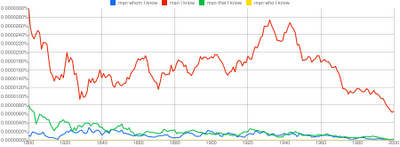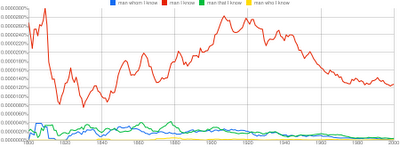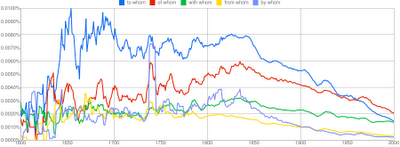Grammar


 And showing whom only when it's used with prepositions.
And showing whom only when it's used with prepositions.

- Whom Confusion
Doing a Google site search of TripAdvisor the other day, I noticed that on the first search page for 'the person whom', this expression was used more often to refer to the subject than to the object, in other words incorrectly, in structures...
- Random Thoughts On That And Wh-words In It-clefts
A couple of years ago I posted a lesson on cleft sentences where I said: The structure is: It is / was + emphasised noun phrase + who / that / when + rest of the sentence Notice that the use of pronouns is the same as in defining relative clauses: who...
- Q & A When Do We Use That Instead Of Who Or Which?
Basic answer The who, which and that the question refers to are all relative pronouns. We can use that instead of who or which in defining (restrictive) relative clauses: For people: - The boy who is climbing the tree is my son. or The...
- Q & A When Do We Use 'whom' Instead Of 'who'.
I'm tempted to say almost never, but I'll try to be a bit more objective. Basic answer - in spoken and informal English, most native speakers use whom very rarely. This is because for most of us whom sounds excessively formal and rather old...
- Whomwatch #2 - Sometimes The Comments Are The Best Part
For the second post in the WhomWatch series I have decided to soften the tone a bit. I'm not going to rant at anyone this time. Instead I would like to discuss two newspaper articles I've read recently, one in the voice of liberal America, the...
Grammar
WhomWatch #1
Fairly recently I had a go at websites that make a big song and dance about people misusing apostrophes. But it's not only apostrophes, there are peevebloggers who moan about the 'misuse' or overuse of certain words (eg literally), the misuse of inverted commas (quotation marks) or the invasion of business buzzwords. And these websites are very popular. So in the spirit of 'Why should the devil have all the good tunes', I'm launching WhomWatch, an occasional blog within a blog.
Now I couldn't care less if people want to use the word whom in their conversation. If they want to sound a bit old-fashioned and slightly quaint, that's their business.
But I do object to so-called experts telling all and sundry that we must always use whom instead of who when it is the object of a clause. Why? Because in real life hardly anybody does. Here are some extracts from Swan, my usage bible:
Whom is not often used in informal English. We prefer to use who as an object, especially in questions. We use whom in a more formal style and we must use whom after prepositions.
And he gives these examples:
Who did they arrest? (Whom did they arrest? - formal)
Who did you go with? (With whom did you go? - very formal)
Who did you go with? (With whom did you go? - very formal)
And I would add that in informal English (in other words, normal spoken English) we try and avoid the preposition problem by putting the preposition at the end of the sentence, as in his example - Who did you go with?. And we almost never use whom for a direct object (in other word without a preposition).
But that doesn't stop people telling us we should. Hence the need for WhomWatch, watching the prescriptivists. The name, by the way, is a reference to a popular 1970s British science-fiction TV series called Doomwatch, which used to scare the shit out of me. I hope WhomWatch will be a little less scary.
WhomWatch #1 - The Apostrophe Protection Society
WhomWatch #1 - The Apostrophe Protection Society
On their 'More problems' page the Apostrophe Protection Society say, rather confusingly:
"Whom" is used less frequently these days but, if used, it should be used correctly. It is used to refer to the object of a sentence ...
I'm pretty sure they used to say 'Always use whom for the object', now they seem to be qualifying it with 'if used'. Perhaps they are beginning to see the light. But they still go on to say you should use it the following examples:
- A man whom I know mends radios
- A girl whom I met recently works from home
So let's look at these rather forced examples. You will of course immediately recognise these as defining relative clauses where whom refers to the object of the main clause in both cases.
Here's Swan again:
In identifying relative clauses, whom is unusual. Either we leave out the object pronoun, or we use that or who.
And Murphy, from English Grammar in Use:
... we do not often use whom. In spoken English we usually prefer who or that, or nothing ...
In other words we don't actually need a relative pronoun at all, so the neatest solution would be:
- A man I know mends radios, he might be able to fix it for you.
- A girl I met recently works from home, she could tell you what it's like.
(I've tried to make these sentences a bit more realistic)
The falling out of fashion of whom is borne out by these results from Google Ngram Viewer, both in British English

and American English

So how about if we substitute some non-defining clauses to make their point a little clearer.
- That man over there, whom I have known for a long time, mends radios.
- The girl next door, whom I met recently, works from home
Swan again:
In non-identifying clauses, we usually use whom when necessary (but these clauses are not very common in informal English)
and Murphy:
... [in non-defining relative clauses ] You can use whom (when it is the object):
This morning I met Diane, whom (or who) I hadn't seen for ages.
This morning I met Diane, whom (or who) I hadn't seen for ages.
In fact everyone I know says who in those contexts, and so do all the TEFL course books we use. I've already written a bit about these nonsense-rules in a previous post. And linguist Mark Liberman, writing recently at top linguistics blog, Language Log, about the even rarer whomever, remarked that:
... 'whom' has been essentially dead for a century, except when a note of dignity or austerity is desired.
The next chart shows the rise and fall of whom and it's use with prepositions in British English since 1600

Yet it's use is still peddled by various websites, and even worse by some sites aimed at foreigners learning English. If students are told that whom is the norm for use as an object, and not that it is only used in a very formal register, these people are doing the students a real disservice, as they are just going to make them sound faintly ridiculous.
And so the need for WhomWatch
Links
- Peeveblogging
- Apostrophe Protection Society - who and whom
loading...
- Whom Confusion
Doing a Google site search of TripAdvisor the other day, I noticed that on the first search page for 'the person whom', this expression was used more often to refer to the subject than to the object, in other words incorrectly, in structures...
- Random Thoughts On That And Wh-words In It-clefts
A couple of years ago I posted a lesson on cleft sentences where I said: The structure is: It is / was + emphasised noun phrase + who / that / when + rest of the sentence Notice that the use of pronouns is the same as in defining relative clauses: who...
- Q & A When Do We Use That Instead Of Who Or Which?
Basic answer The who, which and that the question refers to are all relative pronouns. We can use that instead of who or which in defining (restrictive) relative clauses: For people: - The boy who is climbing the tree is my son. or The...
- Q & A When Do We Use 'whom' Instead Of 'who'.
I'm tempted to say almost never, but I'll try to be a bit more objective. Basic answer - in spoken and informal English, most native speakers use whom very rarely. This is because for most of us whom sounds excessively formal and rather old...
- Whomwatch #2 - Sometimes The Comments Are The Best Part
For the second post in the WhomWatch series I have decided to soften the tone a bit. I'm not going to rant at anyone this time. Instead I would like to discuss two newspaper articles I've read recently, one in the voice of liberal America, the...
